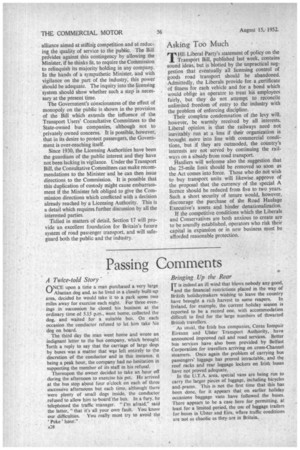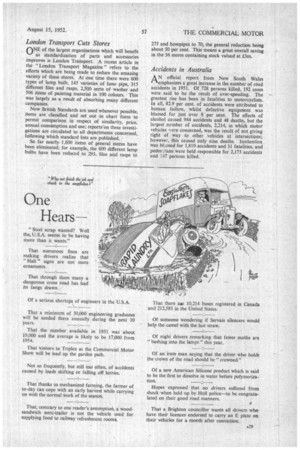Passing Comments
Page 30

Page 31

If you've noticed an error in this article please click here to report it so we can fix it.
A Twice-told Story"
0NCE upon a tittle a man purchased a very large Alsatian dog and, as he lived in a closely built-up area, decided he would take it to a park some two miles away for exercise each night. For three evenings in succession he closed his business at the ordinary time of 5.15 p.m., went home, collected the dog, and waited for a suitable bus. On each occasion the conductor refused to let him take his dog on board.
The third day the man went home and wrote an indignant letter to the bus company, which brought Torth a reply to say that the carriage of large dogs by buses was a matter that wo left entirely to the discretion of the conductor and in this instance, it being a peak hour, the company had no hesitation in supporting the member of its staff in his refusal.
Thereupon the owner decided to take an hour off during the afternoon to exercise his pet. He arrived at the bus stop about four o'clock on each of three successive afternoons but each time, although there were plenty of small dogs inside, the conductor refused to allow him to-board.the bus. In a fury, he telephoned the traffic manager. "I'm afraid," said the latter, "that it's all your own fault. You know our difficulties. You really must try to avoid the 'Peke' hour."
Bringing Up the Rear
I T is indeed an ill wind that blows nobody any good, and the financial restrictions placed in the way of British holidaymakers wishing to leave the country have brought a rich harvest to some reapers. In Ireland, for example, the current holiday season is reported to be a record one, with accommodation difficult to find for the large numbers of thwarted British travellers.
As usual, the Irish bus companies, Coras Tompair Eireann and Ulster Transport Authority, have announced improved rail and road services. Better bus services have also been provided by Belfast Corporation for travellers arriving on cross-Channel steamers. Once again the problem of carrying bus passengers' luggage has proved intractable, and the roof racks and rear luggage lockers on Irish buses have not proved adequate.
In the U.T.A. area, special vans are being run to carry the larger pieces of luggage, including bicycles and-prams. This is not the first time that this has been done, for it appears that on earlier holiday occasions baggage vans have followed the buses. There appears to be a case here for permitting, at least for a limited period, the use of luggage trailers for buses in Ulster and Eire, where traffic conditions are not as chaotic as theyare in Britain.
London Transport Cuts Stores
ONE of the largest organizations which will benefit
as standardization of parts and accessories improves is London Transport. A. recent article in the "London Transport Magazine" refers to the efforts which are being made to reduce the amazing variety of these stores. At one time there were 600 types of lamp bulb, 145 varieties of hose pipe, 315 different files and rasps, 2,500 sorts of washer and 506 items of painting material in 100 colours. This was largely as a result of absorbing many different companies.
Now British Standards are used whenever possible, items are classified and set out in chart form to permit comparison in respect of similarity, price, annual consumption and use; reports'on these investigations are circulated to all departments concerned, following which standard lists are published.
So far nearly 1,600 items of general stores have been eliminated; for example, the 600 different lamp bulbs have been reduced to 293, files and rasps to 273 and hosepipes to 70, the general reduction being about 50 per cent. This means a great overall saving in the 36 stores containing stock valued at Om.
Accidents in Australia
AN official report from New South Wales emphasizes a great increase in the number of rdad accidents in 1951. Of 728 persons killed, 192 cases were said, to be the result of over-speeding. The greatest rise has been in fatalities to motorcyclists. In all, 82.9 per cent. of accidents were attributed to human failure, whilst defective equipment was blamed for just over 8 per cent. The effects of alcohol caused 944 accidents and 48 deaths, but the largest number of accidents, 2,214, in which motor vehicles were concerned, was the result of not giving right of way to other vehicles at intersections; however, this caused only nine deaths. Inattention was bbnned for 1,810 accidents and 31 fatalities, and pedes:5-ians were held responsible for 2,173 accidents and 147 persons killed.




















































































